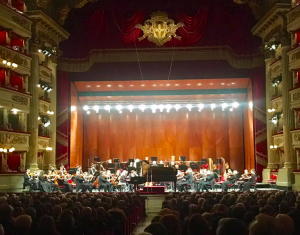EVENTS Israel Philharmonic Orchestra triumphs spectators in Milan
They have worked together for half a century. The relationship between Zubin Mehta and the Israel Philharmonic Orchestra is a life-long love story, which was celebrated at La Scala Theatre in Milan yesterday, during the opening ceremony of MITO SettembreMusica, the classical music festival which takes place every year between Milan and Turin.
The honor of the opening was given to the great Indian maestro and to this friendship, the quintessential artistic expression of the Jewish state, whose aim is to blend together Ludwig van Beethoven and Hector Berlioz’s notes.
This intense new challenge, called “Worlds”, combines two different artistic visions – Beethoven’s music represents nothing but itself and the composer is painstakingly concerned with form; Berlioz, on the other hand, aims to demonstrate that an orchestra can tell stories and weaves his tormented love story around staves.
The relationship between Israel Philharmonic Orchestra and Italy is thus reconfirmed. The Orchestra was founded by Bronislaw Huberman in 1936 and was conducted in its first concert on 26th December that year by Maestro Arturo Toscanini.
Its outreach has gradually widened since – they now play in concert seasons in Tel Aviv, Jerusalem and Haifa, in special events and in different tours in Israel. Moreover, they regularly perform in all cultural centres and in the most prestigious festivals in the world. They frequently encourage Israeli composers to perform in world premieres and have included new immigrants in the ensemble, contributing to their integration.
Mehta became musical counsellor in 1969; in 1977 he was nominated musical director, a position to which, four years later, he was appointed for life. In a recent interview, the Maestro recalled the most moving moment of the past 50 years. “It was February 1991, during the concert during the Gulf War, with Saddam Hussein’s missiles raining on Israel. The program envisaged Brahms violin concerto, played by Isaac Stern as a soloist. Music is part of our soul; we cannot live without it. We wore gas masks – the audience, the orchestra, Stern, and me”.
Translated by Claudia Azzalini and revised by Mattia Stefani, both students at the Advanced School for Interpreters and Translators of Trieste University and interns at the newspaper office of the Union of the Italian Jewish Communities.

